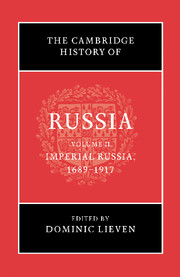Book contents
- Frontmatter
- Introduction
- Part I Empire
- Part II Culture, Ideas, Identities
- Part III Non-Russian Nationalities
- Part IV Russian Society, Law and Economy
- Part V Government
- Part VI Foreign Policy and the Armed Forces
- Part VII Reform, War and Revolution
- Bibliography
- Index
- Map 5. The Russian Empire (1913). From Archie Brown, Michael Kaser, and G. S. Smith (eds.) Cambridge Encyclopedia of Russia 1982.">
- Plate Section">
- References
Bibliography
Published online by Cambridge University Press: 28 March 2008
- Frontmatter
- Introduction
- Part I Empire
- Part II Culture, Ideas, Identities
- Part III Non-Russian Nationalities
- Part IV Russian Society, Law and Economy
- Part V Government
- Part VI Foreign Policy and the Armed Forces
- Part VII Reform, War and Revolution
- Bibliography
- Index
- Map 5. The Russian Empire (1913). From Archie Brown, Michael Kaser, and G. S. Smith (eds.) Cambridge Encyclopedia of Russia 1982.">
- Plate Section">
- References
- Type
- Chapter
- Information
- The Cambridge History of Russia , pp. 670 - 710Publisher: Cambridge University PressPrint publication year: 2006

